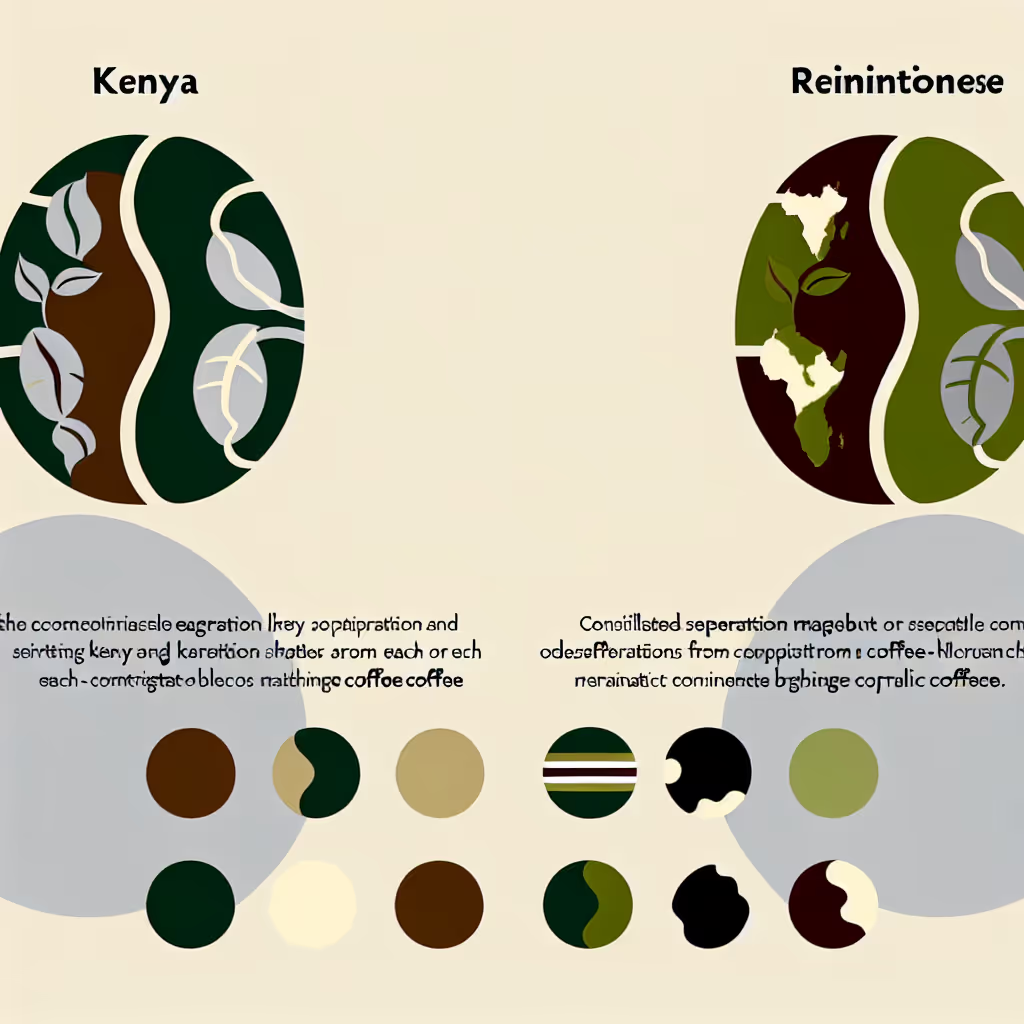Kenyan Vs. Sierra Leonean Coffee
This comparison explores the distinct qualities of Kenyan and Sierra Leonean coffees, examining their flavor profiles, growing conditions, and processing methods to help coffee enthusiasts make informed choices.

Brief Description
Kenyan coffee is renowned for its bright acidity, full body, and complex flavor profile. Grown in the rich volcanic soils of the Central Highlands, these beans benefit from ideal climate conditions and meticulous processing. The result is a cup that's bold, wine-like, and often described as the 'connoisseur's choice'. With notes ranging from blackcurrant to citrus, Kenyan coffee offers a truly unique and memorable tasting experience.
Sierra Leonean coffee is a hidden gem in the world of specialty coffee. Grown in the lush, mountainous regions of the Eastern Province, these beans offer a unique flavor profile that reflects the country's rich biodiversity. Despite facing challenges in recent history, Sierra Leone's coffee industry is experiencing a revival, with farmers and cooperatives working tirelessly to produce high-quality beans that are gaining recognition in the international market.
Importance of Comparison
Comparing Kenyan and Sierra Leonean coffee origins is crucial for coffee lovers seeking to expand their palate and understand the diverse flavors of African coffees. These two origins offer unique taste experiences, reflecting their distinct terroirs and processing methods. By exploring their differences, consumers can make more informed purchasing decisions and appreciate the nuances of specialty coffee.
Key Attributes
Origin
Kenyan
Sierra Leonean


Consumer Guide
When choosing between Kenyan and Sierra Leonean coffee, consider your flavor preferences. Kenyan coffee is known for its bright acidity and complex profile with notes of blackcurrant and citrus, ideal for those who enjoy a bold, wine-like cup. Sierra Leonean coffee offers a more balanced profile with chocolate and floral notes, appealing to those who prefer a smoother taste. For brewing, both origins excel in pour-over and French press methods. Kenyan coffee shines in cold brew, while Sierra Leonean beans work well for espresso. Consider the altitude difference: Kenyan beans grow at higher elevations (1400-2100m), potentially resulting in a more complex flavor, compared to Sierra Leone's 400-1500m range.
Expert Opinions
Coffee expert Maria Rodriguez notes, 'Kenyan coffee is often considered the pinnacle of brightness and complexity in the coffee world. Its unique double fermentation process contributes to its distinctive flavor.' On Sierra Leonean coffee, specialty roaster John Smith comments, 'Sierra Leone's coffee is an emerging star, offering a delightful balance of citrus and chocolate notes. Its revival story adds depth to every cup.' Both experts agree that these origins represent the diverse and exciting world of African coffees.
FAQs
Kenyan coffee is known for its bright acidity, full body, and complex flavor profile with notes of blackcurrant, citrus, and floral undertones. Sierra Leonean coffee offers a more balanced profile with prominent citrus and chocolate notes, complemented by subtle floral accents. The difference in flavor can be attributed to variations in growing conditions, altitude, and processing methods.
Both Kenyan and Sierra Leonean coffees excel in pour-over and French press methods, which highlight their unique flavor profiles. Kenyan coffee is particularly well-suited for cold brew, enhancing its bright and fruity notes. Sierra Leonean coffee performs well as espresso, showcasing its balanced flavor and chocolate notes. Experiment with different methods to find your preferred way of enjoying these distinct origins.
Kenyan coffee is typically grown at higher altitudes (1400-2100m) compared to Sierra Leonean coffee (400-1500m). The higher altitude of Kenyan coffee often results in a more complex and acidic flavor profile, while Sierra Leonean coffee tends to have a smoother, more balanced taste. The altitude difference contributes to the distinct characteristics of each origin.
Kenyan coffee is primarily processed using the washed method, often with a unique double fermentation process, followed by sun-drying. This contributes to its clean, bright flavor profile. Sierra Leonean coffee employs various processing methods, including natural, washed, and honey processing. This diversity in processing allows for a range of flavor profiles within Sierra Leonean coffees.
Kenya produces approximately 50,000 metric tons of coffee annually, while Sierra Leone's production is slightly higher at 60,000 metric tons. Despite the similar volumes, Kenyan coffee has a more established reputation in the specialty coffee market, while Sierra Leonean coffee is gaining recognition as an emerging origin with unique flavor characteristics.
Conclusion
Both Kenyan and Sierra Leonean coffees offer unique and exciting flavor profiles that showcase the diversity of African coffee. Kenyan coffee stands out for its bright acidity, complex flavors, and established reputation in the specialty coffee world. Sierra Leonean coffee, while less well-known, is rapidly gaining recognition for its balanced profile and intriguing chocolate and citrus notes. Coffee enthusiasts should consider trying both origins to experience the full spectrum of flavors these African beans have to offer. Whether you prefer the bold, wine-like qualities of Kenyan coffee or the smooth, balanced taste of Sierra Leonean beans, both origins promise a memorable and satisfying coffee experience.






